Table of Contents
What is a Hyphen?
A hyphen (-) is a punctuation mark used to join two or more words or parts of words together. It helps clarify the meaning of compound terms, word breaks, and numbers. Hyphens are commonly used to create compound adjectives, link words, and split syllables at the end of lines.
Example Sentences:
He is a well-known writer.
The meeting is scheduled for mid-June.
Please re-read the instructions.
When to Use Hyphens
Hyphens connect words or parts of words to create a clear meaning. Knowing when to use them will improve clarity and avoid confusion.
1. In Compound Words (Especially Compound Adjectives)
Use hyphens when two or more words work together to describe a noun.
- well-known actor
2. With Prefixes Before Proper Nouns or Adjectives
Use a hyphen when prefixes like ex-, mid-, or self- come before a proper noun or adjective.
- mid-July
3. In Compound Numbers (From Twenty-One to Ninety-Nine)
Numbers between 21 and 99 require hyphens.
- twenty-one, ninety-nine
4. For Clarity in Certain Words
A hyphen can prevent misreading or change the meaning of a word.
- re-sign (to sign again) vs. resign (to quit)
5. When Splitting Words at the End of a Line
If a word doesn’t fit at the end of a line, use a hyphen to continue it on the next line.
- infor-mation
Hyphen vs Dash
| Feature | Hyphen (-) | Dash (—) |
|---|---|---|
| Purpose | Connects words or parts of words | Separates parts of a sentence |
| Usage | Forms compound words, joins prefixes, or splits words at the end of a line | Adds emphasis, pauses, or changes in thought |
| Spacing | No spaces before or after | Spaces before and after |
| Length | Shorter (-) | Longer (—) |
| Examples | The well-known author gave a speech. My sister-in-law is visiting next week. Please re-read the chapter before the test. | I planned to go to the park today — but it started raining. She was excited — maybe a little too excited — about her promotion. The results were clear — he passed the test with flying colors. |
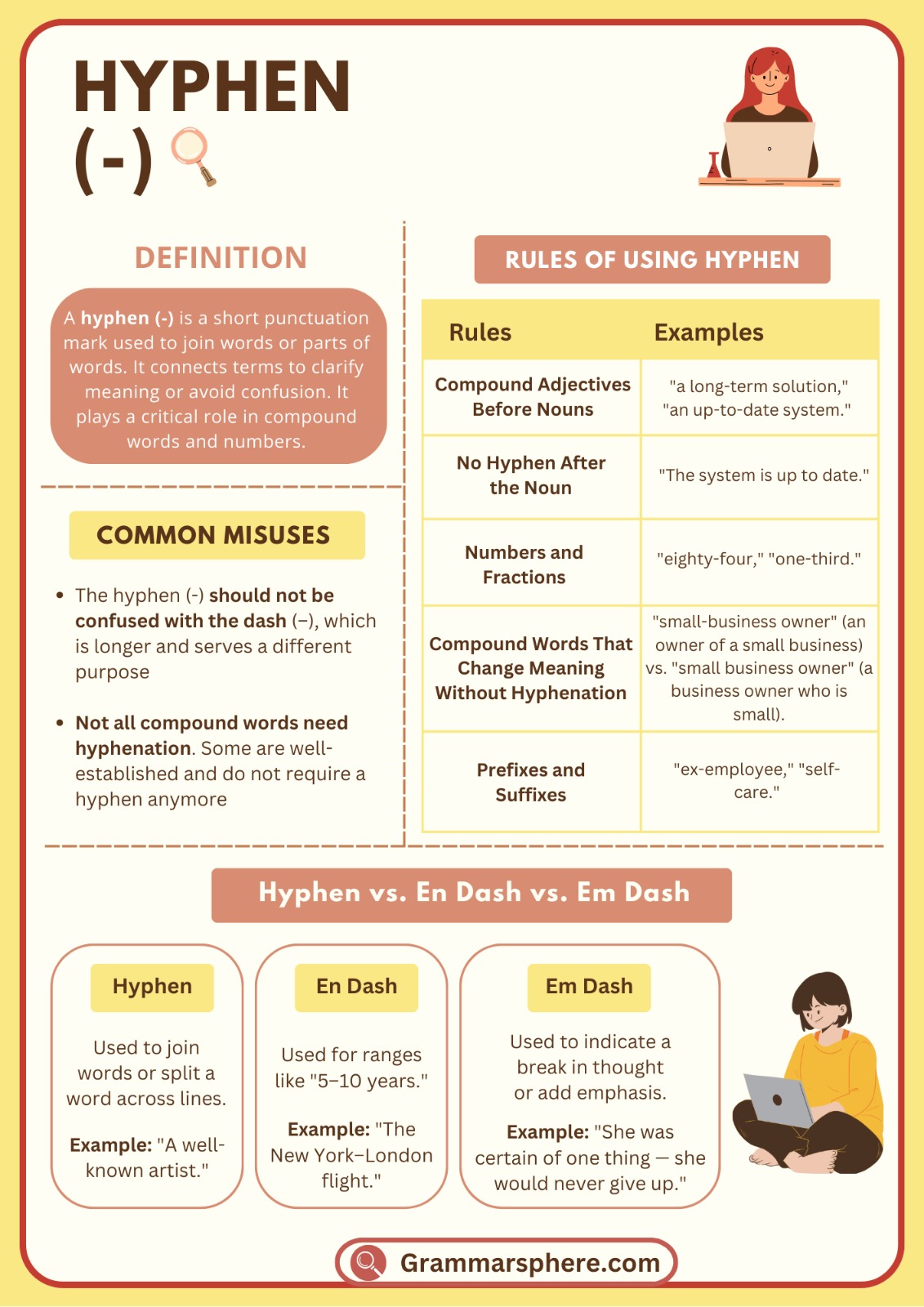
Example Sentences
- She wore a bright-colored dress to the party.
- The well-known actor received an award.
- We ordered a top-of-the-line laptop for work.
- The project will be completed in mid-December.
- My five-year-old nephew loves playing with toys.
- The company is offering a full-time position.
- They lived in a run-down house on the outskirts of town.
- I bought a second-hand car last week.
- We stayed at a five-star hotel during our vacation.
- The editor asked me to re-check the document for errors.
Hyphen with Open and Closed Compound Words
Knowing when to use a hyphen in compound words can be challenging but is key to clear writing. Compounds come in open, closed, and hyphenated forms. Here, we’ll focus on how hyphens help clarify open and closed compounds.
1. Open Compound Words
Open compounds are words that consist of two separate words that work together to create a new meaning. Typically, they are not joined by a hyphen.
- post office refers to a place where mail is processed.
- high school means a school for students typically between the ages of 14 and 18.
2. Closed Compound Words
Closed compounds occur when two words are combined into a single word. Over time, as certain word pairs become more commonly used together, they become closed compounds.
- notebook refers to a book of blank pages for writing notes.
- basketball is a sport involving a ball and a basket.
Hyphens with Prefixes: Ex-, Self-, All-
When using the prefixes ex-, self-, and all-, hyphens are essential for clarity and proper meaning. Each of these prefixes has specific rules for when a hyphen is necessary, and understanding these can help avoid confusion.
1. Ex-
The prefix ex- means former or previous. It always requires a hyphen to indicate that something or someone is no longer in the specified role or status.
- ex-boss refers to someone who was once your boss but no longer holds that position.
- ex-wife refers to a woman who was formerly married.
2. Self-
The prefix self- is always hyphenated when referring to something related to a person’s own identity or actions.
- self-care refers to taking care of oneself.
- self-respect means having respect for yourself.
3. All-
The prefix all- indicates something is complete or entire. A hyphen is required to connect the prefix with the following word, making it clear that it refers to everything within the given context.
- all-knowing refers to someone who knows everything.
- all-star describes someone or something outstanding among others.
Hyphen Rules
1. Compound Adjectives Before Nouns
When two or more words work together to describe a noun, a hyphen is used to connect them. This helps clarify that the words form a single idea before the noun.
- The five-star restaurant is famous for its service.
- She lives in a well-maintained apartment.
2. Compound Numbers (21 to 99)
Hyphens are used in compound numbers between twenty-one and ninety-nine when written out in words. This keeps the number clear and easy to read.
- I bought thirty-three books for the library.
- She will turn seventy-five next year.
3. Prefixes Before Proper Nouns or Adjectives
When prefixes like ex, mid, and self are attached to proper nouns or adjectives, a hyphen is used to connect them for clarity.
- They visited the mid-Atlantic region during their trip.
- He is a self-taught artist who paints beautifully.
4. Words with the Same Letters Together
When combining words that have the same letter at the end of one word and the start of the next, a hyphen is used to avoid confusion.
- I will re-elect the same candidate in the next election.
- The story was about the co-owner of the company.
5. Avoiding Ambiguity
Hyphens can clarify the meaning of words that might otherwise be confusing. They help distinguish between different meanings.
- He decided to re-cover the sofa with new fabric
(vs. recover, which means to get back). - I will re-sign the contract tomorrow
(vs. resign, which means to quit).
Common Mistakes with Hyphen
- Hyphenating Adverbs Ending in “ly”
A common mistake is using a hyphen after -ly adverbs. Adverbs like quickly, slowly, or beautifully should not be hyphenated when modifying adjectives.
✓ She wore a beautifully designed dress.
✗ She wore a beautifully-designed dress.
- Omitting Hyphens in Compound Adjectives
Another mistake is omitting hyphens in compound adjectives before a noun, which can cause confusion about word grouping.
✓ He is a well-known author.
✗ He is a well known author.
- Overusing Hyphens in Compound Nouns
Overusing hyphens in compound nouns is a common mistake. Some compounds are standard as single words or separate words and don’t need a hyphen.
✓ She has a boyfriend.
✗ She has a boy-friend.
- Using Hyphens Instead of Dashes
Writers often confuse hyphens and dashes, using hyphens instead. Hyphens connect words, while dashes create emphasis or indicate a pause.
✓ She was late — again!
✗ She was late – again!
You May Also Like

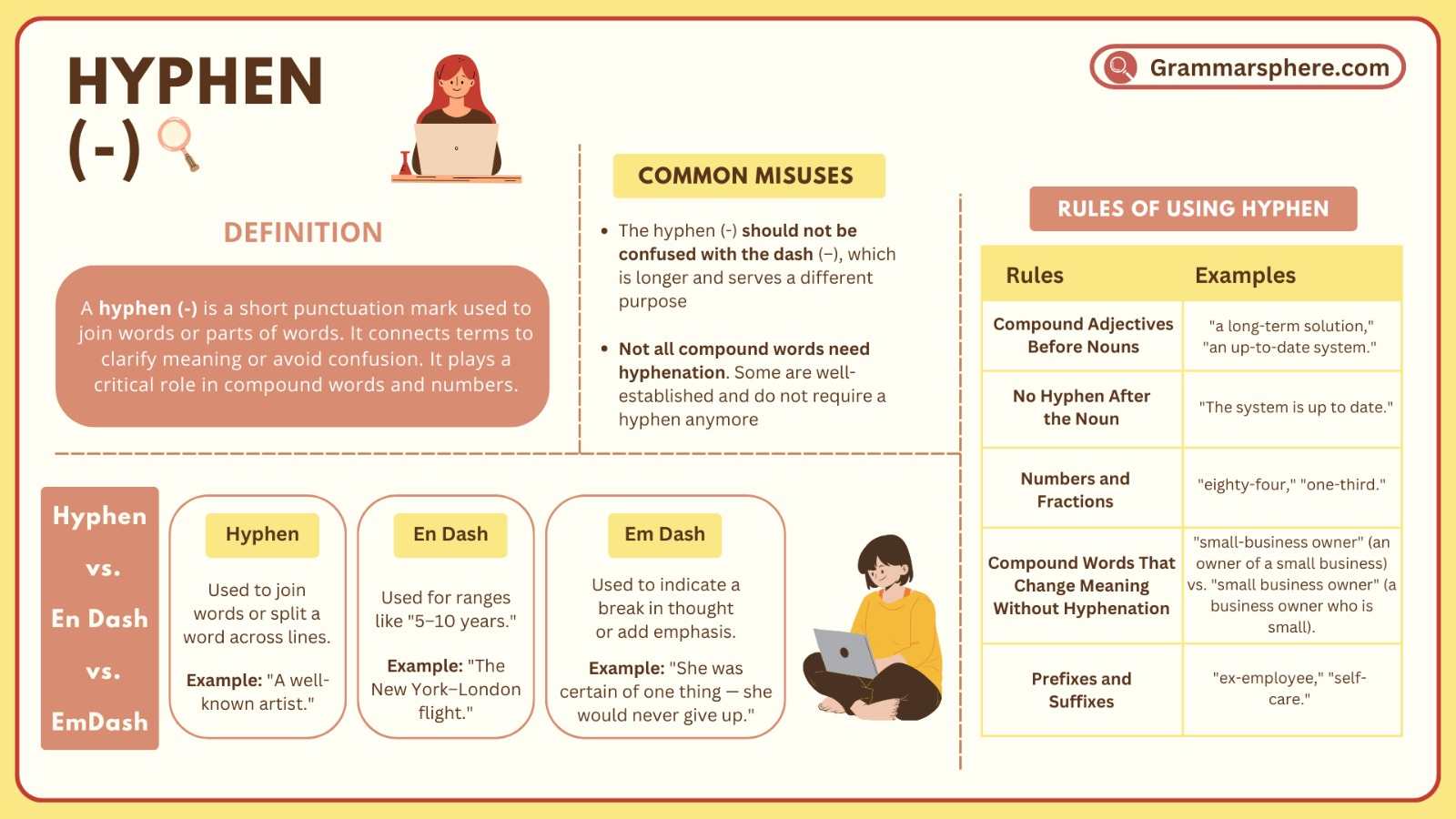
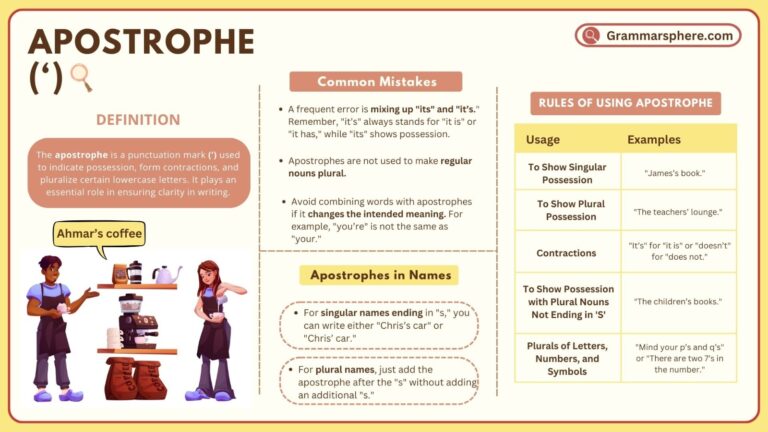
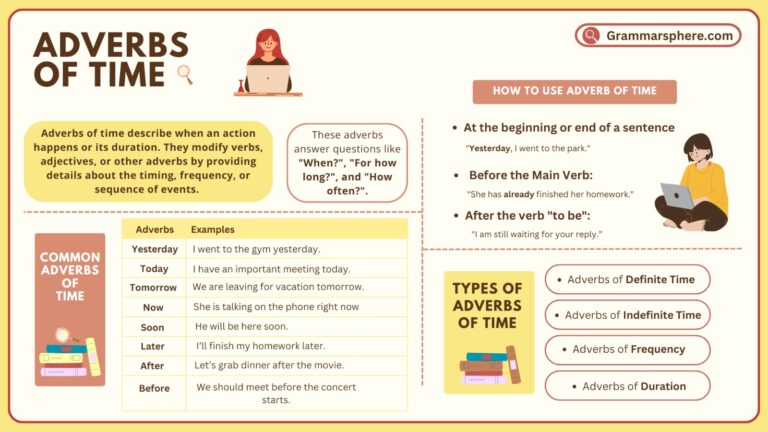
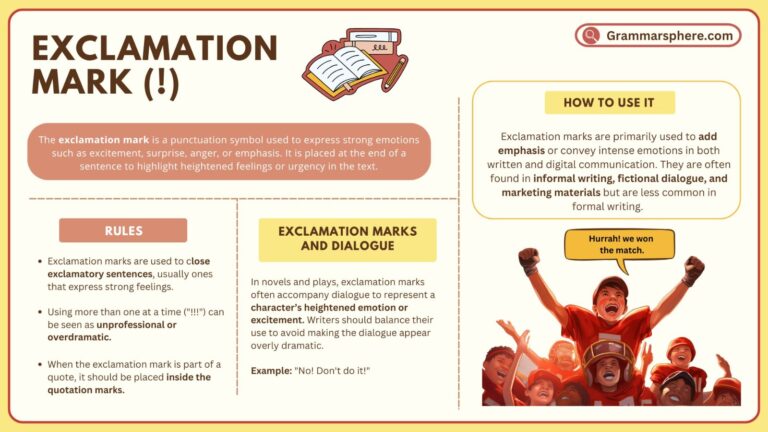
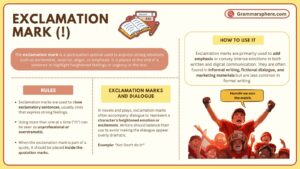
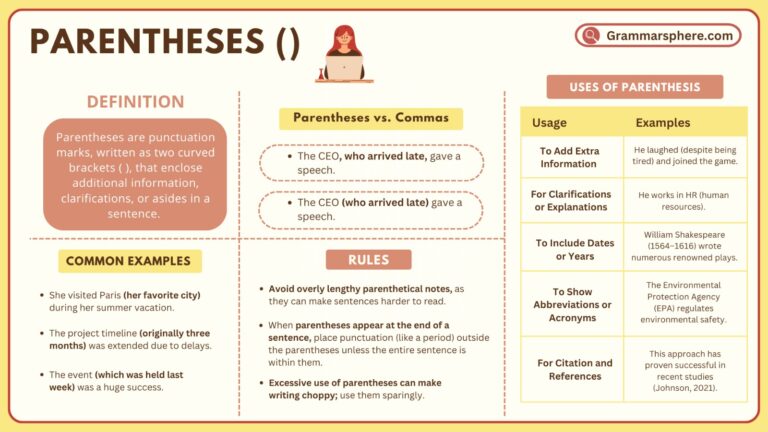
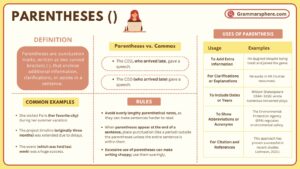
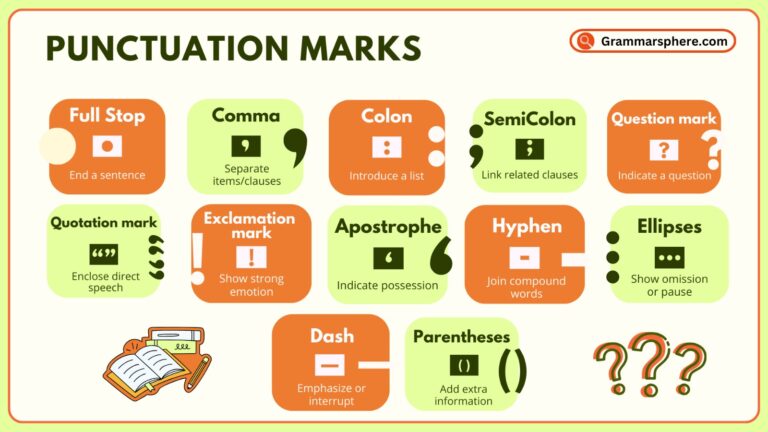
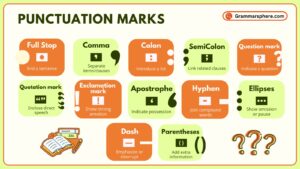
Leave a Comment